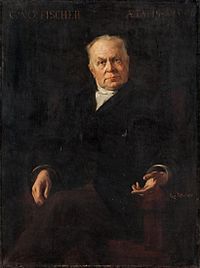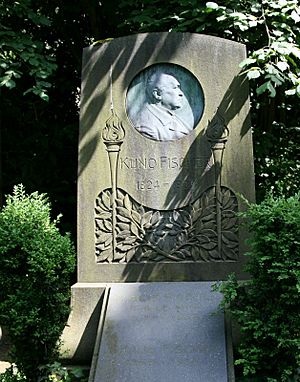Kuno Fischer facts for kids
Quick facts for kids
Kuno Fischer
|
|
|---|---|
| Born | 23 July 1824 Sandewalde (near Guhrau), German Confederation
|
| Died | 5 July 1907 (aged 82) |
| Education | University of Leipzig University of Halle (PhD, 1847) |
| Era | 19th-century philosophy |
| Region | Western philosophy |
| School | Hegelianism (early) Neo-Kantianism (late) |
| Institutions | Heidelberg University University of Jena |
| Thesis | De Parmenide Platonico (On Plato's Parmenides) (1847) |
| Academic advisors | Christian Hermann Weisse (Leipzig), Johann Eduard Erdmann (Halle), Julius Schaller (Halle) |
| Notable students | Richard Falckenberg |
|
Main interests
|
Metaphysics |
|
Notable ideas
|
The empiricism–rationalism distinction |
|
Influences
|
|
|
Influenced
|
|
Ernst Kuno Berthold Fischer (born July 23, 1824 – died July 5, 1907) was an important German philosopher. He was also a historian who studied the history of philosophy and a critic.
Kuno Fischer's Life Story
Kuno Fischer studied philosophy at the Leipzig University and the Halle University. In 1850, he started teaching at Heidelberg University. At first, he was a "privatdocent," which means he was a private lecturer who was paid directly by his students.
In 1853, the government of Baden stopped him from teaching. This was because they didn't like his "liberal ideas," which were new ways of thinking about society and government. However, this made many people support him even more.
In 1856, he became a full professor at the University of Jena. He became very well-known there because of his strong character. Later, in 1872, he returned to Heidelberg University. He took over from another famous philosopher, Eduard Zeller, as a professor of philosophy and German literature.
Fischer was known for being a great speaker. He could explain difficult ideas very clearly. He became famous mainly for his work as a historian of philosophy. He wrote many books and articles explaining the ideas of other philosophers.
He generally followed the ideas of the Hegelian school of philosophy. His writings, especially his explanations of Kant's ideas, led to a disagreement with another professor named F. A. Trendelenburg. In 1860, Fischer's book, Kants Leben und die Grundlagen seiner Lehre (Kant's life and the foundations of his doctrine), helped start a movement called "return to Kant." This movement encouraged people to study Kant's original ideas again.
In 1904, when Kuno Fischer turned 80, many other famous thinkers published a special book to honor him.
Kuno Fischer's Ideas
One of Kuno Fischer's most important contributions was how he sorted philosophers. He used the idea of empiricism and rationalism to group thinkers, especially those from the 17th and 18th centuries.
- Empiricism is the idea that we get all our knowledge from our senses and experiences. Thinkers like John Locke, George Berkeley, and David Hume are in this group.
- Rationalism is the idea that we can gain certain knowledge just by thinking, using pure reason, even before we experience things. Philosophers like René Descartes, Baruch Spinoza, and G.W. Leibniz are in this group.
While this way of sorting philosophers was very influential, some people today think it's not always perfect. They believe it might not fully capture the exact ideas of these philosophers.
Kuno Fischer's Writings
Kuno Fischer wrote many books and articles. His most famous work is often considered to be his Geschichte der neuern Philosophie (History of modern philosophy). This large work was published in several volumes between 1854 and 1877. It explains the ideas of many great philosophers.
Here are some of the philosophers he wrote about in this series:
- René Descartes
- Gottfried Wilhelm Leibniz
- Immanuel Kant
- Johann Gottlieb Fichte
- Georg Wilhelm Friedrich Hegel
- Arthur Schopenhauer
Some of his other important works include:
- De Parmenide Platonico (On Plato's Parmenides, 1847)
- System der Logik und Metaphysik oder Wissenschaftslehre (System of logic and metaphysics, or doctrine of knowledge, 1852)
- Franz Baco von Verona (about Francis Bacon, 1856)
- Schiller als Philosoph (Schiller as a Philosopher, 1858)
- Lessings “Nathan der Weise” (about Lessing's play "Nathan the Wise," 1864)
- Baruch Spinozas Leben und Charakter (Spinoza's Life and Character, 1865)
- Shakespeares Charakterentwickelung Richards III (Character development of Shakespeare's Richard III, 1868)
- Kritik der Kantischen Philosophie (Critique of Kantian Philosophy, 1883)
See also
 In Spanish: Kuno Fischer para niños
In Spanish: Kuno Fischer para niños
 | Anna J. Cooper |
 | Mary McLeod Bethune |
 | Lillie Mae Bradford |



